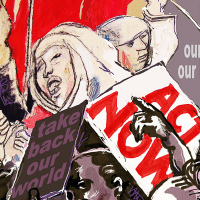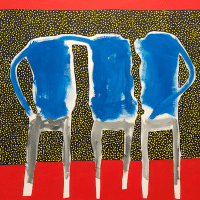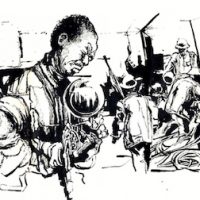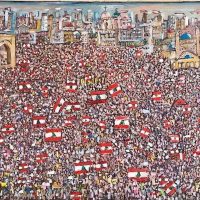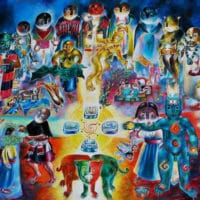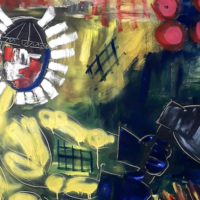-
When confronted by us hungry bellies, the imperialists reach for their guns
The United States government was furious about the ‘irresponsible extravagances’ in Nkrumah’s book and decided to punish him by refusing to allow $300 million in short-term aid to cover the costs of importing food.
-
Hunger will kill us before Coronavirus
In April 2020, a month after the World Health Organisation (WHO) declared the pandemic, the UN’s World Food Programme (WFP) warned that the numbers of people who lived with acute hunger around the world would double due to COVID-19 by the end of 2020 ‘unless swift action is taken’.
-
Not just an orchard, not merely a field, we demand the whole World
When news of the revolution in the Tsar’s empire filtered into British-dominated India in 1917-1918, the reception was universal: if they could overthrow the Tsar, then we can overthrow the British Raj.
-
Six complexities of these pandemic times
Social media, in March 2020, was awash with rumours. Swans and dolphins could be seen in totally deserted Venetian canals. A group of elephants marched into a village in Yunnan (China), drank corn wine, and went to sleep in a tea garden.
-
Only the struggle of the people will free the country
On 18 August, soldiers from the Kati barracks outside Bamako (Mali) left their posts, arrested president Ibrahim Boubacar Këita (IBK) and prime minister Boubou Cissé, and set up the National Committee for the Salvation of the People (CNSP).
-
Tell the people that the struggle must go on
Young children marvel at an obvious contradiction in capitalist societies: why do we have shops filled with food, and yet see hungry people on the streets? It is a question of enormous significance; but in time the question dissipates into the fog of moral ambivalence, as various explanations are used to obfuscate the clarity of the youthful mind.
-
It is late, but it is early morning if we insist a little
Nothing happens in Beirut and Lebanon that is transparent; plots of all kinds unravel against the ordinary hopes of the population.
-
Do not reach for the sky just to surrender
The novel coronavirus continues its march through the world, with 18 million confirmed cases and at least 685,000 deaths. Of these, the United States of America, Brazil, and India are the worst-hit, harbouring about half of the world’s cases.
-
Humanity protests against the crimes of death
On 23 July, World Health Organisation (WHO) Director-General Dr. Tedros Adhanom Ghebreyesus announced that the world now has 15 million people infected by COVID-19.
-
Some are in super-yachts and others are clinging to drifting debris
COVID-19 has exposed the lie that free markets can deliver healthcare for all, the fiction that unpaid care work isn’t work, the delusion that we live in a post-racist world. We are all floating on the same sea, but some are in super-yachts and others clinging to drifting debris.
-
Each heartbeat must be our song; the redness of blood, our banner
Too little has been made of the fact that countries like Laos and Vietnam have been able to manage the coronavirus; there are no confirmed deaths from COVID-19 in either country.
-
Ten-Point agenda for the Global South after COVID-19
In 1974, the United Nations General Assembly passed a New International Economic Order (NIEO), which was driven by the Non-Aligned Movement (NAM).
-
Living is no laughing matter
The United States government has withdrawn its support for the World Health Organisation (WHO) based on accusations that the WHO has not been forthcoming about the novel coronavirus and based on U.S. President Donald Trump’s questioning of the WHO’s independence from China, calling the organisation a ‘puppet of China’.
-
Goliath is not invincible
Last year, I walked with Mariela Machado in her housing complex known as Kaikachi in the neighbourhood of La Vega (Caracas, Venezuela). After Hugo Chávez was inaugurated president in 1999, a group of working-class residents of the city saw an empty piece of land and occupied it. Mariela and others went to the government and said, ‘We built this city.
-
If you do not feel for humanity, you have forgotten to be human
The coronavirus continues its contagious march across the planet: almost 350,000 known deaths and over 5.4 million people infected. Meanwhile, in the Bay of Bengal, Cyclone Amphan makes its fierce landing, its immense energy tearing a corridor through Bangladesh and India (Odisha and West Bengal).
-
The Bouficha appeal against the preparations for war
On 23 March, the UN Secretary General António Guterres called for a ceasefire. ‘The fury of the virus’, he said, ‘illustrates the folly of war’. In a recent report, the Armed Conflict Location & Event Data Project (ACLED) wrote that the ‘call for a global ceasefire has not had the desired result’.
-
Hunger gnaws at the edges of the World
On 21 April, the head of the UN World Food Programme (WFP) David Beasley said that the world was experiencing a ‘hunger pandemic’. That day, the Global Network Against Food Crises and the Food Security Information Network released the 2020 Global Report on Food Crises.
-
It takes a revolution to make a solution
I admit upfront that this is a hard newsletter to read. It is about debt. There is a bloodless quality to the way that we talk about the debt of the poorer nations. There is nothing poetic here. The numbers are alienating, their outcome shocking.
-
Farewell to the god of plague
The Communists were determined to eradicate disease. In the 1930s, Mao joined the Chinese Communist Party’s Public Health Commission; in 1934, when he was in the Jiangxi Soviet, Mao placed public health at the top of the list for party work.
-
Either socialism will defeat the louse or the louse will defeat socialism
The International Monetary Fund (IMF) says that the Great Lockdown, which has no end date, could very well lead to a loss of $9 trillion to global Gross Domestic Product over the entirety of 2020 and 2021; this number is greater than the combined economies of Japan and Germany. This scenario, the Fund’s managing director Kristalina Georgieva admits, ‘may actually be a more optimistic picture than reality produces’.

